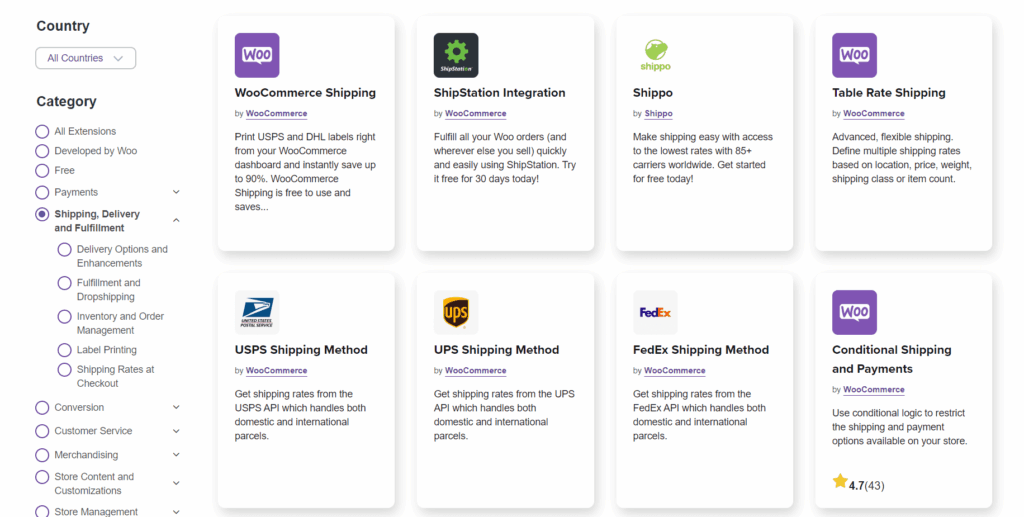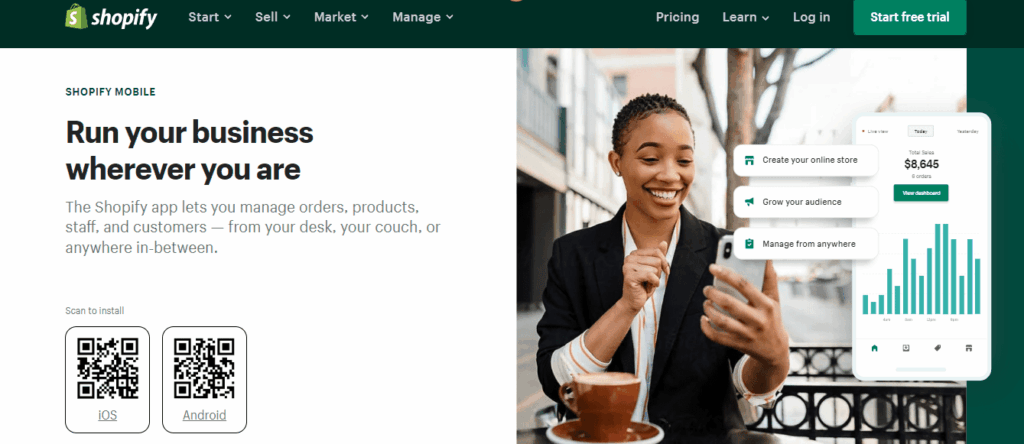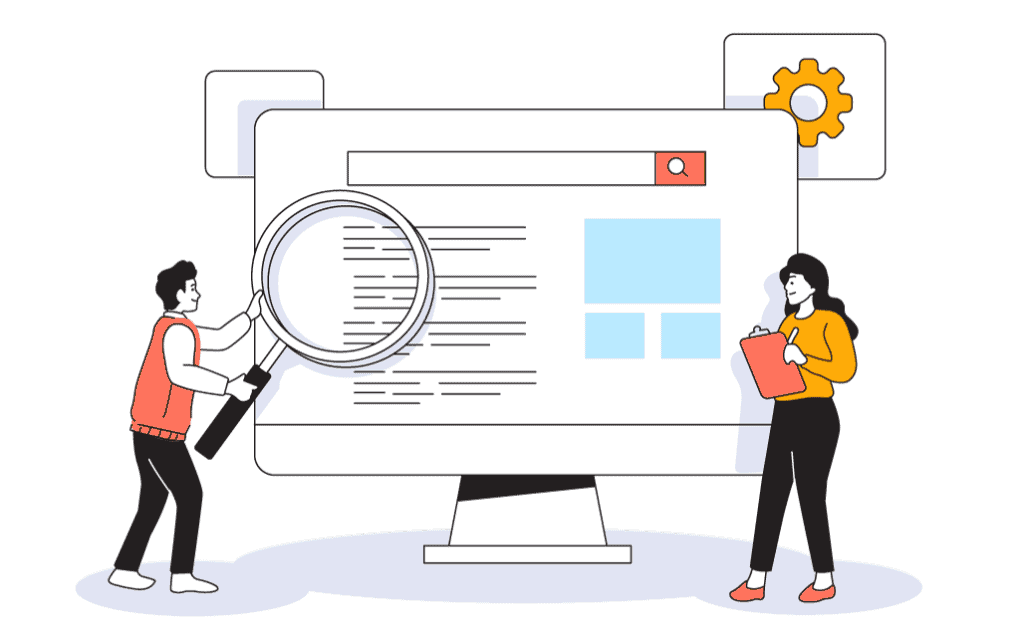If you’re an entrepreneur looking to establish an online store, choosing your ecommerce platform is an important decision.
With dozens of ecommerce platforms available and more emerging every year, it can be challenging to decide which platform offers the best combination of services, features, and pricing.
So, how do you know which ecommerce platform fits your needs best?
In this guide, we'll walk through some key considerations for selecting the ideal ecommerce platform to create and grow your business in 2025 – read on to learn more!
What is an ecommerce platform?

When you hear the term 'ecommerce platform,' you might think of a website like Amazon or eBay.
After all, they are both very apparent platforms when shopping online.
However, Amazon and eBay are not examples of ecommerce platforms!
Amazon and eBay are examples of online marketplaces. While they may seem like ecommerce platforms, there are some critical differences between online marketplaces and ecommerce platforms. (We will discuss those below.)
So, what is an ecommerce platform exactly?
An ecommerce platform is a software solution that enables a business to sell products or services online through its own website. In addition to hosting a website, an ecommerce platform provides tools for managing inventory, processing payments, and shipping orders.
The main difference between an ecommerce platform and an online marketplace is that an ecommerce platform allows you to set up your own website.
In contrast, an online marketplace is an already-existing website where you sell products amongst other retailers.

In other words, an ecommerce platform helps you create both the forefront of your store and the 'brains' behind it, integrating parts like order, product, and customer management into a comprehensible whole.
It enables you to do things like:
- Managing and fulfilling your orders.
- Adding, editing, or removing your products.
- Looking at your store's analytics.
- Editing the appearance of your online store.
- And much more!
11 Factors to consider when choosing an ecommerce platform
An ecommerce platform is a complex tool, and companies spend millions each year to further develop their platform and try to make it superior to competitors' platforms.
There are quite a few things you can consider when choosing an ecommerce platform. Here are 11 of the most important ones!
1. The platform's focus
First of all, it’s important to consider the platform's focus.
Different ecommerce platforms are optimized for different types of commerce.
For instance, dropshippers generally require specific fulfillment and delivery solutions that traditional ecommerce stores do not. Similarly, digital products often require unique features such as subscription billing or digital content distribution.
So, evaluate the capabilities of each platform to ensure it can accommodate your particular needs!
Here are some examples of ecommerce platforms focused on specific types of online stores:
- ShopBase: Built for dropshipping & print on demand.
- Gumroad: Built for selling digital services.
- SamCart: Built for selling digital products.
- Big Cartel: Built for artists & makers.

Note: Not all platforms are designed for a specific type of store. Many ecommerce platforms can accompany varying types of online stores. For instance, you can use Shopify to start a dropshipping store, sell digital products, and more.
2. Pricing
Cost is always an important consideration when choosing an ecommerce platform.
The pricing of an ecommerce platform can vary significantly depending on its capabilities.
Some platforms may offer free versions but usually include limited functionality or are advertising-based. Others have subscription models with annual or monthly fees and sometimes feature volume discounts.
So, before choosing an ecommerce platform, ask yourself these questions:
- Are there setup costs for this ecommerce platform?
- Do they charge a monthly or yearly fee?
- If the platform is free, will you need to pay extra for any additional features you might need?
- Do they take a percentage of your revenue? Is this fixed, or does it fluctuate based on traffic or sales?
- Can you easily upgrade or downgrade your pricing plan?

3. Ease of use
Another important factor to consider is the ease of use.
You want to choose an intuitive platform so that you can quickly and easily set up your store and manage it daily, even if you don't have any technical experience.

Platforms that offer video tutorials, setup wizards, and drag-and-drop editors are usually great for helping inexperienced users get started quickly.
The last thing you want is to spend hours figuring out how to use your ecommerce platform only to give up in frustration.
4. Payment gateways
When finalizing a sale, you will need a way to collect money from your customers safely.
That's where payment gateways come in.
When choosing an ecommerce platform, ensure that it can connect to the most popular and well-recognized payment gateways (such as PayPal, Stripe, or Square).

Ensure that the available payment gateways are secure, compliant with the latest data protection regulations, and offer features such as fraud prevention tools and recurring billing support.

You can also check if the fees associated with each transaction are reasonable and make sense for your specific business model.

5. Shipping integrations
If you plan on selling physical products, you’ll need to ensure that your ecommerce platform integrates with your chosen shipping provider (such as UPS or FedEx).
This integration will allow you to automatically calculate shipping rates and print shipping labels from within your ecommerce platform. Without it, you’ll need to handle shipping manually, which can be very time-consuming.

6. Marketing tools
Most ecommerce platforms come with various built-in marketing tools that can help you promote your business and products online.

These tools include email marketing, social media integrations, and search engine optimization (SEO).
For example, one of the benefits of an SEO-friendly ecommerce platform is that it can help you to rank higher in search engine results pages (SERPs).

And, when your store appears more often on search engines like Google, it will increase traffic and sales!
7. Third-party applications
It doesn't matter which ecommerce platform you pick; there is a high likelihood you will have to install additional apps or plugins to get the exact functionalities you need.
And if you want your store to run smoothly together with those apps, your ecommerce platform must have an integration for them.
Many good ecommerce platforms will offer some kind of app store where you can find apps and plugins designed to connect to your store.
For example, here is an image of the app store on BigCommerce:

8. Customer support
Even the best platforms can have issues from time to time, so you must have access to customer support if you run into any problems. Ideally, you should choose a platform that offers 24/7 customer support via phone, email, or live chat.
Additionally, see if the platform has a knowledge base system so you can look up answers on your own.
For example, Shopify has an excellent support team that offers 24/7 support:

They offer award-winning support via phone, chat, email, or Twitter. But they also have a large Shopify community forum where you can connect with other merchants to learn and get support.
You can also find answers to your questions through the Shopify Blog, tutorials, webinars, and the Shopify Youtube channel.
9. Scalability
Another important factor to consider is scalability.
If you anticipate your business growing rapidly, you will need an ecommerce platform to accommodate that growth.
You will need a platform that allows you to easily add new products, categories, and features as your store grows.
Not to mention, you'll need a platform that can handle the increased traffic and sales volume!
Otherwise, you may have to switch platforms down the road, which can be both costly and time-consuming.
For example, in 2015, Gymshark's website (then built on Magento) went down for eight hours straight during Black Friday.
The crash cost Gymshark an estimated $143k in sales and a loss of customer trust!
Since then, Gymshark migrated to Shopify Plus and never had any more problems related to scalability. What's more, they grew to a $1.2+ billion company with a 900-strong workforce.

10. Order management
Another factor to consider is order management. You will need an ecommerce platform that makes tracking orders and managing customer information easy.
Adding or removing products from your store as needed should also be easy.
So, before choosing a platform, consider the following:
- Can you view, edit, create, and fulfill orders directly from the admin dashboard?
- Can you print invoices, packing slips, and shipping labels?
- Is there a limit to the number of products you can publish?
- Can you offer multiple variants of one product?

11. Mobile-friendly
Next up is the platform's mobile-friendliness.
This goes in two directions.
First of all, will your store offer a great experience for mobile visitors?
Remember, around 56% of online sales come from mobile devices, so having a mobile-friendly online store is critical.
Second, will you be able to work on your store from your mobile devices?
In today's dynamic world, some ecommerce platforms like Shopify offer a mobile app that allows you to manage your online store from anywhere:

How do you choose the best ecommerce platform?
Now that you know about the factors to consider, you're already much better prepared to choose the right ecommerce platform.
If you're unsure of which ecommerce platform to pick, take our quiz here to get a personalized recommendation based on your needs:
Or, you can use our Ecommerce Platform Advisor GPT to easily find which ecommerce platform fits you!
But how do you choose the best one yourself?
Here are five steps to follow:
1. Consider your business's needs
The first step in choosing the best ecommerce platform for your business is to consider your needs.
- What is your ecommerce business model?
- Which features do you need to carry out that business model?
- Do you need any integrations with other third-party tools and services?
- What type of products do you sell?
- How many products do you sell?
- What are your shipping and fulfillment needs?
Answering these questions will help you narrow down your options and choose a platform that is well-suited for your business.

2. Research your options
Once you understand your business’s needs, you can begin researching your ecommerce platform options.
There are many different platforms available, so it’s important to take the time to read reviews and compare features.
Researching different platforms and their features can help guide your decision because you can find one or a few that meet your business's needs.
Remember, some platforms may be more suited for certain types of ecommerce businesses than others, so be sure to keep that in mind as you research.

3. Consider your budget
The following step in choosing an ecommerce platform is your budget.
Different platforms offer different features and pricing options, so it's important to estimate how much you are willing and able to spend before making any decisions.
Look for an ecommerce platform that offers the features you need at a price point that fits your budget.
Keep in mind that you may need to pay additional fees for things like hosting, domain names, and payment processing, so be sure to factor those into your budget as well.

4. Compare features
Once you’ve narrowed your options to a few platforms, it’s time to compare features.
If everything goes well, all options on your list should provide the features your business requires.
However, here are some other great features you may want to look for:
- Automated abandoned cart recovery emails.
- Advanced analytic reports.
- Store language translation.
- Pre- and post-purchase upsells.
- Product reviews.
- Multi-channel selling support.

5. Choose a platform and get started!
After doing all your research, you should now be ready to choose an ecommerce platform for your business.
Once you’ve made your decision, it’s time to get started!
And before we go towards the end of the article, here is a tip; most platforms offer free trials, so be sure to take advantage of them before committing to a paid plan!
Tip: Have you already created your Shopify account? If not, sign up by clicking this link here to get a free 3-day trial + 3 months for $1 each!

5 Awesome ecommerce platforms to check out
Research can be time-consuming, so we selected five top ecommerce platforms you should check out in 2025.
The table below presents the best ecommerce platform options depending on your needs:
| You need: | The best option(s) for you: |
| The best platform overall for ecommerce | Shopify or BigCommerce |
| The best SEO performance | WooCommerce |
| The platform built explicitly for dropshippers | ShopBase |
| The cheapest platform | Shift4Shop (in the US) or ShopBase |
| The platform that offers the best resources | Shopify |
| The most flexible and customizable platform | WooCommerce |
| The platform with the easiest setup for a dropshipping store | ShopBase |
Tip: Looking for an in-depth review of each platform? You will find it in this article!
Summary
Before we go to the conclusion, we've created a quick summary of this article for you, so you can easily remember it:
- Ecommerce platforms are software solutions that enable businesses to sell products or services online through their own websites.
- In contrast to online marketplaces (e.g., Amazon, eBay), ecommerce platforms allow businesses more control over their website and include tools for managing inventory, processing payments, and shipping orders.
- There are many factors to consider when choosing an ecommerce platform, including focus/specialization, pricing, ease of use, available payment gateways, and mobile-friendliness.
- To choose the best ecommerce platform, consider your business's needs, research your options, and consider your budget. Lastly, compare the platforms' features to find the one that fits you best!
Conclusion
If you’re looking for an ecommerce platform to create your online store, there are a few factors you’ll need to consider first.
The platform’s focus, pricing, ease of use, and marketing tools are just a few.
Once you’ve found the right fit, it’s time to start building your dream store.
Not sure where to start? Check out our guide on how to create an online store here!
And don’t forget to have some fun with it! Building and launching a new online store can be a very exciting time for any business owner.
Have a great rest of your day!
Want to learn more about ecommerce?
Ready to move your online store to the next level? Check out the articles below:














